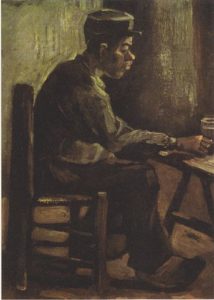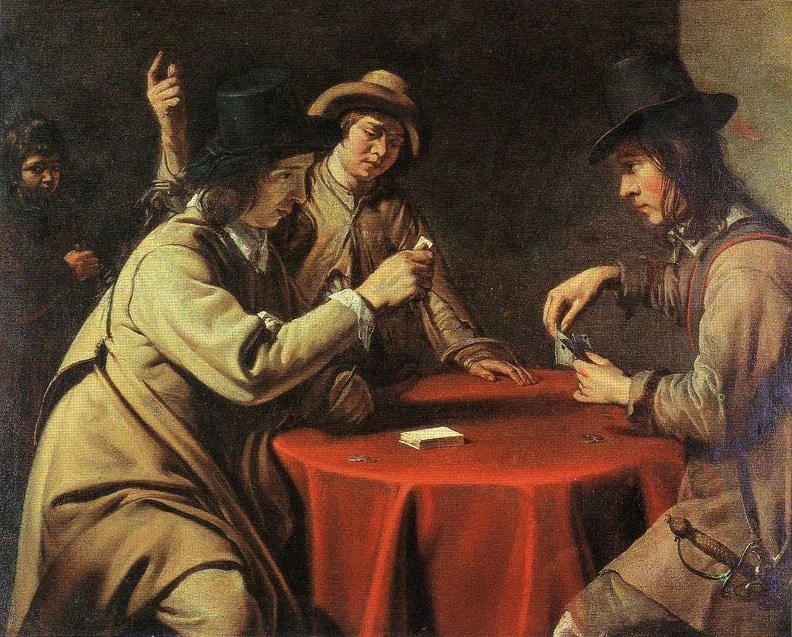Shaky Hands

Some things take years to realize.
My earliest memories are of family dinners. A distinct one occurred after my first day in the first grade at St. Jerome’s Primary School.
Father sat at the head of the table, between the dining room windows. Without a glance, I knew his face would be stern. Mom put potatoes on my plate and said, “Chet, what did you learn from Sister today?”
“Well, Sister is so strict. We have to pay attention all the time.”
Barbara, my big sister, wiggled her eyebrows at me. I fought the urge to laugh.
Missing Barbara’s antics, Father said, “As it should be.” “You’re not at school for fun, but to learn. You can’t even write letters yet?”
“Henry,” Mom smiled toward the head of the table, “go ahead, dear.”
Meanwhile I had forked some roast beef and stuffed it in my mouth. I started to answer while chewing, “At the top of the blackboard …”
Father’s hand slammed down, rattling the plates and glasses. “Where’s your manners? Sit up straight. Don’t slouch. Never talk with food in your mouth.”
Looking back, I realize this wasn’t natural. It wasn’t natural that we had to sit still, practically at attention. It wasn’t that we had formal dinners, but we were not to talk, except when Mom asked about our day at school or to say, “Yes, sir,” when Father assigned chores. But, oh yeah, it wasn’t quiet when Father exploded if we disrupted his peace.
I understand now. Father longed for the quiet of farm life, after a long day doing tedious tasks in a stuffy office. He demanded a quiet dinner, after which he would sip coffee, smoke Camels, and read the daily paper.
~ ~ ~
One evening, I must have been about eight, Barbara requested to leave the table before Father had finished his dinner, to work on her homework. Mom glanced at him. He nodded slightly. She answered, “Okay, but Barbara put your plate and glass in the sink first.”
Barbara jumped up, grabbed her dishes, and rushed to the kitchen. I continued eating, but my meal was interrupted by Father’s hand slamming down.
I dared to sneak a peek. Barbara stood at the kitchen door way, eyes wide with alarm. Her plate was tilted from the horizontal.
“Why don’t you just spill everything all over the floor?” Father said, eyes bulging.
She looked at him. “Yes, Father.” A vexed look flashed across her face. She turned the plate over—a chicken leg and splashes of applesauce fell to the floor.
A burst of laughter escaped my mouth, before I could stifle it.
Father started to rise from his seat. What might he do to his favorite child? I would never find out. Mom diverted him. “Henry, she did what you said.” She smiled faintly; was that to comfort Father or an appreciation of Barbara’s prank? “You can’t be mad at her obedience.”
She turned to Barbara. “Get a dish rag. Clean up that mess and bring your father the coffee.”
I released a breath I hadn’t realized I was holding.
Barbara returned. She wiped the floor. Surprising me, Father settled back into his chair, apparently satisfied. He sprinkled a spoon of sugar into the coffee, while glancing at the newspaper’s headlines.
That dinner became a cherished memory. Barbara broke the rules, didn’t get punished, and we got to laugh. I wanted to do something as courageous at some future dinner.
I was too much a follower of rules to escape father’s handcuffs on my own actions; however, after graduating from St. Jerome’s I went to the public magnet high school. There I made a new friend, Charles.
He invited me to dinner and for the first time I realized how unusual our dinners were. His family laughed while they talked and ate.
~ ~ ~
Later in the fall of the ninth grade, on a Sunday afternoon, I walked to the library for an intense afternoon with my geometry text. High school demanded more thinking and less memorization than St. Jerome’s.
Afterward, fatigued from mental effort, I wandered toward home. As I passed the pizza shop on the Avenue, a knock on the glass caught my attention. Charles, my new friend, gestured me to come in.
He led me to a table by the juke box. We chatted about Euclid, school, and girls. After a while the smells of pizza awakened my hunger, but I didn’t have any dinero. I looked outside and realized it was nearly dark. I would be late for dinner. After a quick see-you-in-school-tomorrow, I took off, running for home.
Father was unforgiving. My punishment for missing dinner was childish. Make-work chores. Every day, all afternoon. Until dinner. No pickup football. No hanging out with the neighborhood guys.
That pissed me off so bad, treating me like a child for the trivial offense of upsetting his dinner routine. I had to get back at him, somehow.
That week went so slow. Everything in the basement was picked up. Mom and I replaced all the screen windows with storm windows. The grass was cut. The hedges trimmed. The corner behind the upright piano completely dusted. Homework assignments completed to a perfection I never again achieved. While aligning Father’s Popular Mechanics magazines, I leafed through its classified ads where one suggested something, making me smile.
Monday the next week, instead of riding the bus all the way home, I got off at the Avenue, near the sundries store. Their new chemistry section had it. Foaming sugar!
I got home fifteen minutes late to start my chores. I knew Mom wouldn’t give my tardiness away to Father.
A few nights passed before I got my chance. Finally, Mom and Barbara were busy in the kitchen and Father wasn’t home yet, when I set the table. I poured the fake sugar into the sugar bowl. All dinner long, an undercurrent of mirth flavored my interpretations of Father’s doctrinaire positions.
Barbara told Mom that a boy she liked waited for her after steno class. Father declared school was for education, not socializing. I chuckled to myself, swallowing my disagreement.
At last, Father handed his empty plate to Barbara. He lifted the edge of the evening paper, scanning the headlines. I bubbled with excitement as I helped clear the remaining dishes. From the kitchen doorway, I watched Father pour his nightly cup of coffee.
He scooped the sugar and sprinkled it into his coffee, his eyes on the paper, not his cup. It wasn’t until he lifted it for a sip, foam touched his lips, that he realized something was amiss. Father’s eyes grew wide, his jaw fell as he tried to grasp why white foam flowed out of his cup. “What in blazes?” He pushed away from the table. Standing up, his thighs shook the table. Thank god, most of the dishes were already cleared.
Looking around, he followed Barbara’s eyes to me. “Dammit, what the hell did you do, Chet?”
I swallowed, then lied. “An experiment from chemistry class.”
Barbara laughed. “He got you, Father. You never even noticed.”
“Goddammit. Of course not. You don’t experiment on your own family.” He eased back into his chair. “You ruined my after-dinner coffee!”
Mom spoke up then. “Chet, get your father a fresh cup.” With emphasis, she added, “And, Barbara, bring the pure bag of Domino’s sugar.”
I hurried to the kitchen, out of his sight. I overheard Father say, “Barbara, that’s enough laughter. This better never happen again.” Then louder, he called out, “Get in here, Chet.”
“Yes, sir,” I said, placing another cup by his right hand.
Mom cleared her throat. “Perhaps, Henry, too many hours stuck in the house led to his mischief.”
Father looked disgusted but nodded. “Yeah, perhaps he’s not man enough to take the punishment he earned. Okay, Chet, but if you ever pull a stunt like this again, you’ll never see the outside again.”
I nodded okay, but the only way I could fulfill that promise was to avoid as many dinners with him as possible.
Thereafter, dinner at Charles’s house and then homework became a regular excuse. Mom accepted it before Father got home.
~ ~ ~
Barbara got married as soon as she was of legal age. That wasn’t an avenue I wanted to follow, instead I joined the Marines to get away. Yet when I completed boot camp, I came home for a visit. I knocked on the door one Friday evening.
Mom hugged and ushered me into the dining room, where Father sat with his paper and coffee. He glanced up. “Tell me, big man, how did you enjoy the swamps of Parris Island?”
I grunted, then realized he expected an answer. “I only saw a bit of the place. The DIs never let us wander. Our every moment was theirs, although they did run us along the water’s edge until some guys dropped.” Seeing Mom’s face fall, I added, “But not me.”
“See,” Father said, “You ought to thank me. I prepared you well.”
Yea, I zoned them out too. I turned to Mom, “How’s Barbara doing?”
Mom sighed. “She stops by most Sunday afternoons with the twins and Jerry. It’s too bad you didn’t let us know you were arriving tonight. She would have been here.”
“I didn’t know when I’d get in.”
“Chet,” Father interrupted, “tell me. Was it the physical or the mental which was hardest?”
“I made it through both. That’s all I want to say about it now.” I decided to throw him a hard ball. “How’s work been at the office?”
“Goddammit, don’t ignore my questions!” Father’s hand crashed down onto the table. Everything shook.
A tightness arose in my chest that I hadn’t experienced since the first morning of boot camp when the DIs snapped on the barracks lights, threw trash cans against the metal bunks, and screamed every vile imprecation they could think of. Realizing that I’d lived through that, I relaxed against the grain of his mini-tirade.
“Really, Henry.” Mom spoke up. This was a change. She used to shrink in her chair, trying to be invisible, like me. “Don’t ruin Chet’s first day home.”
“Where’s my coffee, Natalie?” he said, giving orders rather than asking a question.
Mom got up, went to the kitchen, and returned. Neither Father nor I said a word while she was gone. She filled his empty cup.
He dipped the sugar spoon into the container, but as it moved to his cup, his hand shook. The hand that rattled the table spilled grains of sugar.
“Goddammit, Natalie. Why did you shake the table?”
“That wasn’t me, Henry.” Her forehead furrowed. She stood up, turned briskly in a manner I knew as a rebuff to him, and went into the kitchen.
For years, I avoided his dinner table tyranny. Now his fearsome hand shook in ordinary movements. It made me angry. Why didn’t he control it? Why did he blame it on Mom? The old bastard.
I went into the kitchen. I told her I would be over at Charles’ house for the rest of my leave.
~ ~ ~
After completing my military service, I started my business. The years flew by. I got married, had my own family.
When Mary Jane chided me at the dinner table, “Please, Chet, let the children talk.” I struggled mightily to not quash their childish prattle. With as much grace as I could muster, I encouraged them to go on. I didn’t want to be the tyrant of the dinner table.
Later, one day when I neared fifty, my big sister, Barbara, called and asked me to stop at her house that evening.
“Father’s retiring,” she said. “Yes, he was difficult when we were children, but that’s ancient history. It no longer affects us. I going to throw him a retirement party. Will you help? You could start by addressing invitations.”
Without dispute, I took her list and a stack of invitation envelopes. Writing wasn’t something I did often. Mary Jane handled the checkbook, the bills, and the correspondence, leaving me free to run the remodeling business. Carefully with effort, I addressed the first and then the second invitation.
I shook my hand to get the cramps out after the unusual exercise.
The third envelope took longer, requiring tight control on my hand. After another brief rest, I picked up the next envelope. I squibbed the last letter of the name. The address was ruined. I tossed it aside.
I picked up another envelope. Just as my pen reached the paper, my hand shook. A blot spread across the envelope.
“Goddammit.”
Barbara looked up. “Don’t worry about it, Chet. We have extras.”
I wrote another, but try as I might, my hand wouldn’t stay where I wanted it. There was no blot, but I couldn’t read it. No one could read.
Control of my hand was beyond me. My fingers shook as I held the pen. Just like Father’s had when he first spilt the sugar, those many years ago when I was home on military leave. “Just like Father’s.” The damn loss of control that I hated in him.
Barbara tilted her head. “It’s a little problem. Adjust to it. Some things are beyond your control or his. Perhaps that also explains his tirades.”
“Let’s not go crazy,” I snapped. “Some things are beyond our control, but not everything.”
Image: Farmer at a Table by Vincent van Gogh – Copied from an art book, Public Domain, https://commons.wikimedia.org/w/index.php?curid=9362152


